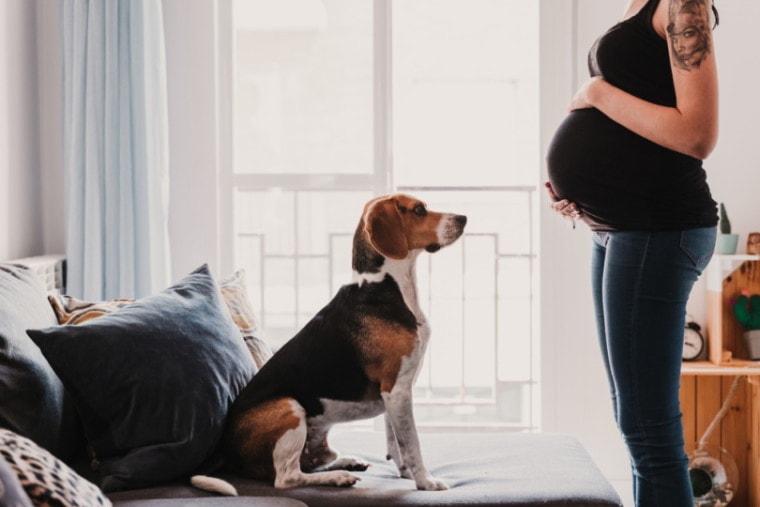
Click to Skip Ahead
Having a dog at home is a precious experience. Once you bond, you gain a lifetime best friend. One fascinating characteristic about dogs is their incredible sense of smell and sharp instincts. For instance, though they cannot realize that you are pregnant, they can actually detect some changes through scent.
The minute you become pregnant, your body starts to change, starting with your hormones. As hormonal changes continue to occur, your body scent becomes different in the process. This change is what your dog smells and senses something is different. Do dogs really know you’re pregnant? Some people say yes. However, it’s important to note that this sense of perception is not backed by any scientific data—yet.
Meanwhile, dogs are brilliant animals, and once they pick up on something, you’ll notice their behavior change. They become more protective and want to stay near. Such a remarkable trait warrants more research which we shall cover in this article, so stay put and read on.
How Do Dogs Sense Pregnancy in Humans?
The bond between a human and their dog is all about scents. A dog falls in love with your natural scent when you are together. The more you bond, the more familiar the scent becomes to your furry friend. They can smell you anywhere and know you’re around.
However, pregnancy marks a period of change in a woman’s life.1 Your body has to make certain changes to accommodate the new life growing in your womb. The process includes loads of hormonal changes that impact your natural scent.

Hormones Change Body Odor
One day, your fur friend takes a whiff of you and realizes something is different. They understand your body is changing significantly. The change in appearance and behavior helps your dog confirm its fears.
Pregnancy hormones start immediately. These not only impact your body’s scent but also affect how you behave and appear.
For example, you produce gonadotropin on week two after successful fertilization. The hormone is quite crucial because it’s what doctors use to confirm pregnancy from a sample of your blood or urine.
Your body’s scent is also altered by several other hormones like prolactin, which stimulates your breasts to produce milk and relaxin, which is responsible for loosening your body’s ligaments and muscles as you get ready to give birth.
Finally, another pregnancy hormone is progesterone, responsible for feeling tired and exhausted. But, it’s crucial because its effects on the womb help to maintain a supportive environment for the fetus’s development. Pregnancy hormones do influence your natural scent, even if you don’t notice this change.
They also impact how you feel and your mood. Your dog not only smells the change in scent but also observes a shift in behavior. Remember, dogs are quite observant and will know something is up from the get go.
Changes in Emotions and Routines
When pregnant, your emotions and normal routines take a dramatic change. It just happens as your body adjusts to the new way of life for the next nine months. Since your best friend is used to a certain routine, they will notice when you change.
For example, if the walks aren’t as long and a certain room is different in the house, they notice it. It’s because a dog is quite sensitive and gets accustomed to certain things and practices. Seeing you tired, walking slower, or any other behavioral change confirms what they smell.
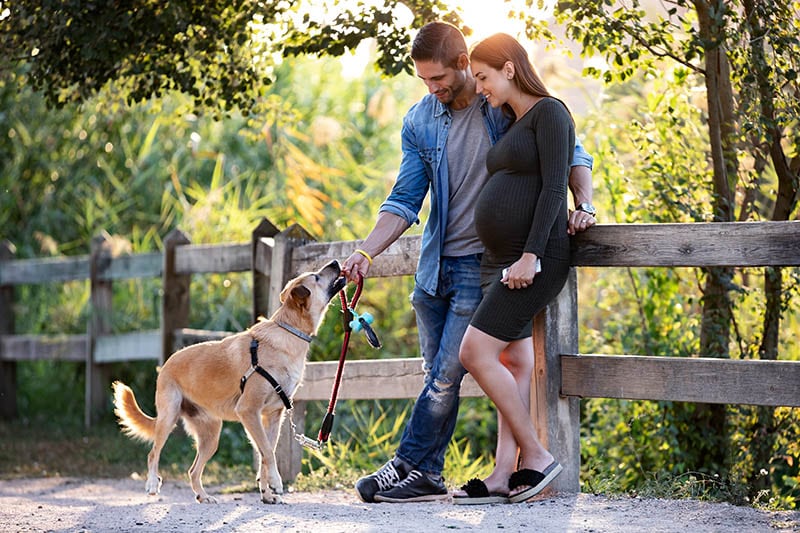
How Early Can a Dog Detect Pregnancy?
Picture this: you are pregnant and have no clue! You go about your days oblivious of the changes taking place in your body. But, your perceptive best friend smells the change even before your belly starts to extend.
Your dog can detect pregnancy from as early as the first month. It’s because pregnancy hormones begin working your body early. Even at week 2, you already have hormones flooding your body. These hormones change your scent, and your dog smells it.
Imagine what a lovely story it would be to tell that your dog detected your pregnancy before you knew it!
Still, not all dogs can smell the body scent change, and others can wait until your belly starts to grow. That’s when you notice your dog’s behavior also taking a dramatic shift.
Will a Dog’s Behavior Change When You Are Pregnant?
You won’t be the same after confirming you’re pregnant. Well, your dog isn’t any different. They, too will change their behavior and want to be close to you always.
One thing many dog owners have in common is a clingy best friend. A dog that only occasionally wanted cuddles and to sleep next to you changes behavior. Now you literally trip over them since they don’t want to leave your side.
Another reason a dog’s behavior can change is that they notice your behavioral changes. For instance, if you feel nauseated, are moving slower, and sleep most of the time, your dog will act differently. If it was bouncy and running everywhere, it will stop and even start sleeping by your side all day.
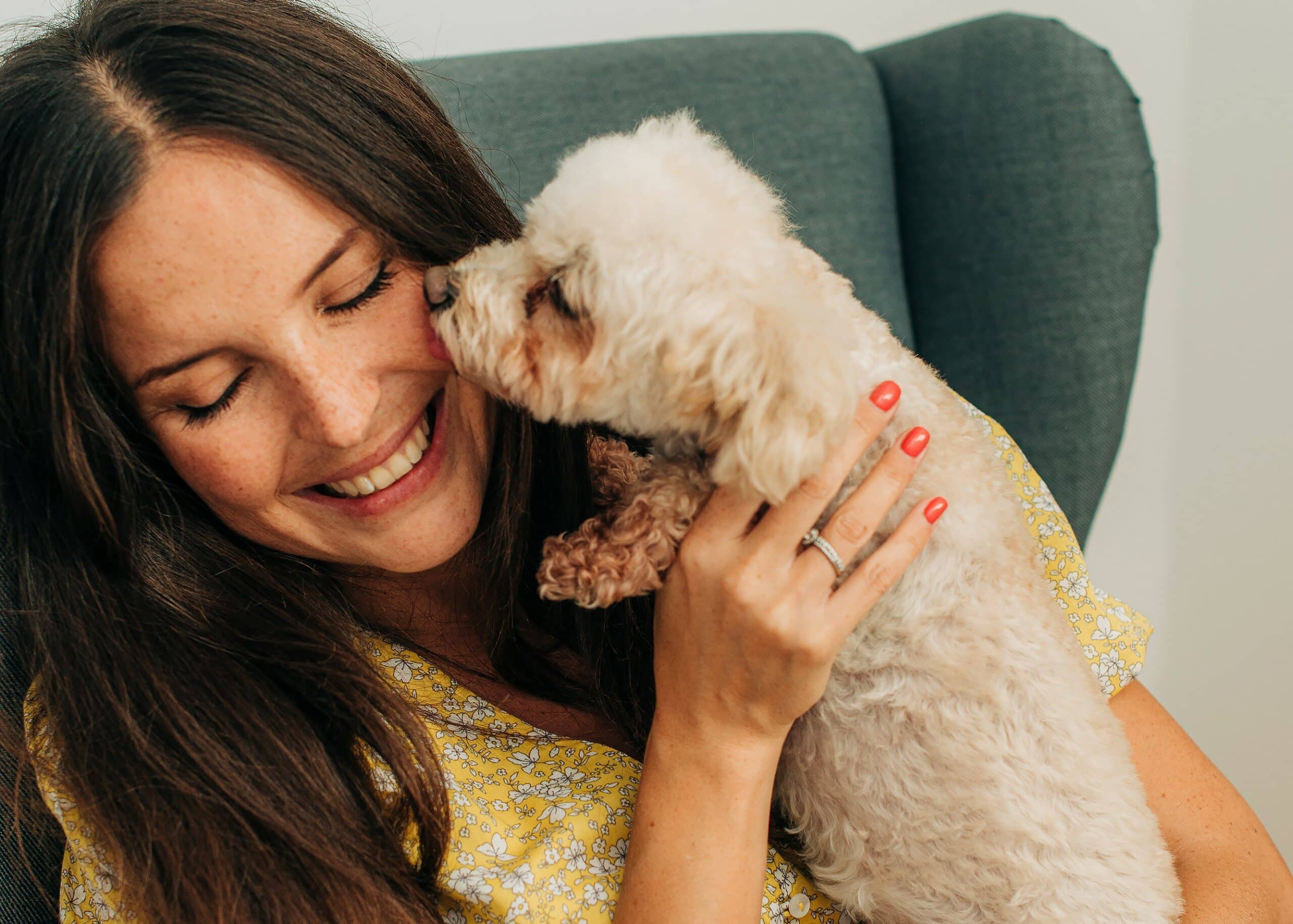
Expect More Affection from Your Dog
It’s pretty standard for your dog to be more affectionate. Even if they usually are, the level of affection changes dramatically through the course of your pregnancy. Your fur friend also is more alert and protective. This is even from the people close to you, including your partner.
As your belly grows, your dog tends to lie on it a lot. They want to get close, and some people believe they’re listening to the baby’s heartbeat. Your dog cuddling up to the growing baby bump is typical behavior, and shows you extra affection.
But, it’s not all roses, as some dogs take a step in the opposite direction. You tend to notice your dog is acting out. For example, if they always get more of your attention, their behavior does the same the minute that changes.
Apart from acting out, a dog may become unfriendly. The change in scent and behavior perhaps overwhelms them. You notice your fur friend starts growling, not communicating, and can even full-on bark at you. In such cases, you should consult advice from a specialized animal behaviorist or you will need to keep distance between the two of you for the foreseeable future.
When you become pregnant, the whole family goes through certain changes. This includes your dog. Their behavior changes either in a positive or negative way.
How Can You Prepare Your Dog for the New Arrival?
If your dog’s behavior changes when you’re pregnant, the behavior may persist even after the baby arrives. It’s because they sense a change coming but can’t grasp its meaning.
However, instead of winging it to see how they react, it’s safer to prepare your dog because you can’t actually tell how it will respond to a newborn. It’s primarily a critical moment if this is the first baby your dog is coming into contact with. The tips below will come in handy:
1. Bring Them to the Park
In the park, dogs meet other dogs, birds, people, and babies. You can have them interact with a small child or a baby in the park while taking caution. This means when you bring a baby home, your dog will already know how to behave near the fragile new arrival.
Some dogs even become close protectors and guides to the baby after they start moving about. It’s all about that first interaction and making a dog understand that a baby should be handled gently, protected, and loved.
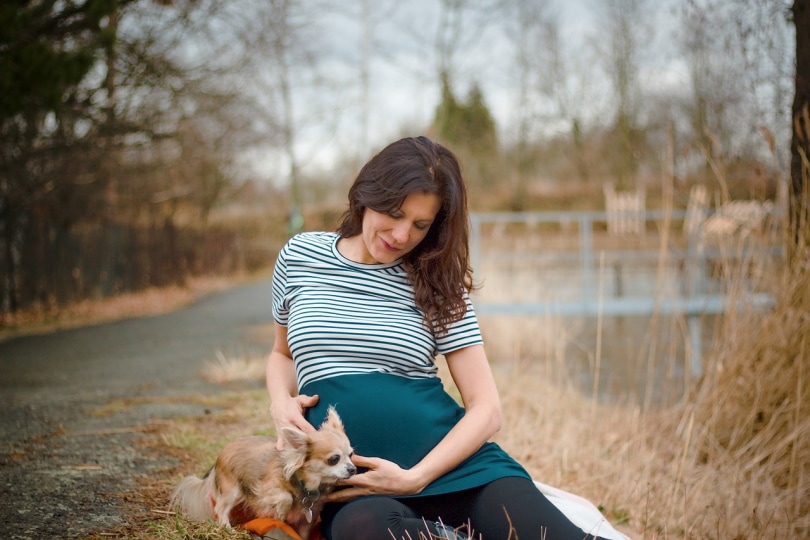
2. Be Less Affectionate and Attentive
Hold back a little! This doesn’t mean you completely ignore your fur friend. It means you have to reduce how attentive and affectionate you are towards them. Less attention is crucial because you won’t always have the time to be with your dog once the baby arrives.
So, you can try simple ways to detach that won’t affect your dog. In time, they get used to the change and won’t be too reactive when you are more attentive to the newborn.
3. Keep Your Dog on a Leash
When you come home from the hospital, your dog might get excited. This excitement continues when they notice the newborn. To be safe, it’s better to have them on a leash and have someone holding them firmly until they calm down.
Having a newborn in the house will require everyone in the house to make adjustments. This includes your dog, who will want to bless the new family member with love and affection.
4. Train Your Dog Not to Jump
A growing baby is still fragile and will move around the house a lot. In such a home, it’s better to have a calm dog that doesn’t jump up and down, as this can be dangerous. If your dog behaves this way, you might need to train it differently before the baby arrives.
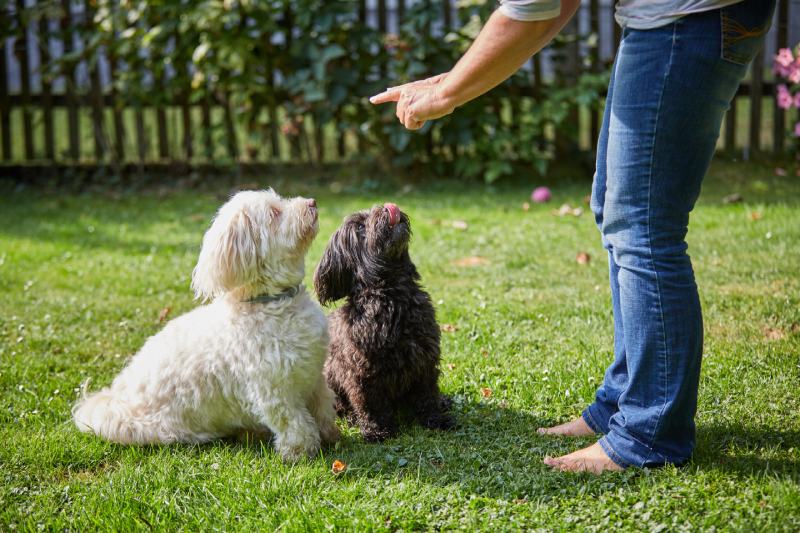
Conclusion
Dogs are intelligent and quite perceptive. They use scent and observation to notice changes around them. This is how your dog sees you are pregnant even before you confirm it. As you start secreting pregnancy hormones, your body’s scent changes, and a dog picks up.
Even if they don’t notice the scent, they notice a behavior change. As your pregnancy develops, you might have less or more energy. In addition, your dog sees your belly grow and senses a difference in your general behavior. So we can conclusively say that a dog will sense pregnancy, although they can’t actually tell that it’s pregnancy.
Featured Image Credit: eva_blanco, Shutterstock









